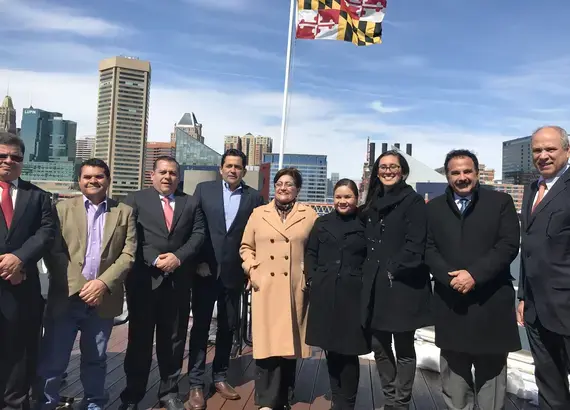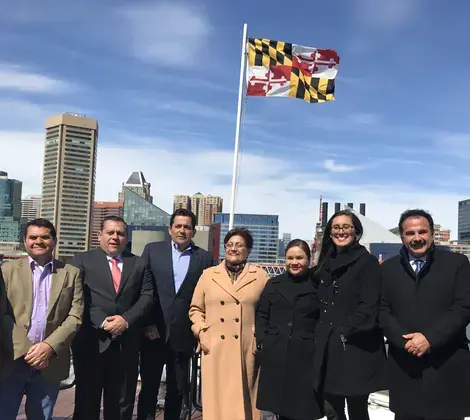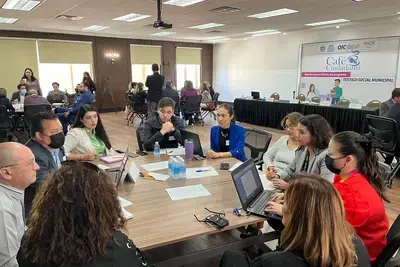
Baltimore, MD - After meeting with representatives from Safe Streets, the delegates took advantage of the good weather to pose for a photo with Maryland’s state flag before they headed to a meeting at the district office of U.S. Congressman Jamie Raskin.
Success Story
International Exchange Gives Central American Leaders Opportunity to Explore Strategies to Improve Citizen Security
Gang violence, organized crime and corruption have long plagued Central America’s Northern Triangle (Guatemala, Honduras and El Salvador), undermining democratic reforms and hampering public safety and prosperity. Because these challenges are so widespread, an effective response must involve every level of government, from city councils to national legislatures. Governments, local police and concerned citizens groups recognize the need for international collaboration to develop effective solutions.
From March 19 to 23, a group of nine legislators from the Northern Triangle traveled to Washington, D.C. and Baltimore, Maryland to meet with U.S. leaders, local government officials and community organizers to discuss how parliaments can play an active role in strengthening security and fostering prosperity across the region.
“The problems that we’re facing are shared problems,” said Guatemalan Congresswoman Karina Alexandra Paz Rosales during a discussion with board members of the Institute for Representative Government (IRG), a nonprofit organization that partnered on this parliamentary exchange program with NDI. “What happens in the United States affects us and vice-versa.[...] We’re very pleased to be here discussing these issues with both U.S. participants and our fellow Central American congressmen.”
The problems that we’re facing are shared problems. What happens in the United States affects us and vice-versa.[...] We’re very pleased to be here discussing these issues with both U.S. participants and our fellow Central American congressmen.
-- Guatemalan Congresswoman Karina Alexandra Paz Rosales
Exchange participants met with U.S. government officials who set policy at the national level, as well as local officials charged with protecting citizen security in neighborhoods and communities. On the first three days of the exchange, participants met with U.S. policymakers, including: officials from the Department of State), the U.S. Agency for International Development (USAID) and the National Security Council; representatives from civil society organizations, including experts from the Open Government Partnership, Demand Progress, Inclusive Security and various think tanks; and U.S. representatives and congressional staff, including Representatives David Price (D-NC), Jamie Raskin, (D-MD), Peter Roskam (R-IL), Ileana Ros-Lehtinen (R-FL), Albio Sires (D-NJ). Discussions focused on U.S. immigration policy and ways to strengthen national-level coordination to fight international criminal networks.
“Illegal immigration into the United States is of course something that concerns us, but I think the delegates [...] would agree that the roots of the issue are the economic and security problems in our own countries,” said Congressman José Alfredo Saavedra Paz from Honduras during a meeting with NSC officials. “The solution to our security and economic problems is also a solution to the immigration problem.”
During the meetings with USAID and the Inter-American Development Bank, the delegates focused their comments on the issues of security, impunity and employment, reiterating their commitment to strengthening democratic institutions and the justice system in their home countries.
“The meetings with U.S. officials are a great opportunity for all of us from the Northern Triangle to get a message across about what our goals are, what our concerns are, what is most pressing for us. [...] We have the chance to lay out our most important points and let them know how committed we are to improving the situation,” said Congresswoman Cristina Quinto García from Guatemala.

Participants also traveled to Maryland where they met with the local government officials and representatives from community-based organizations. The delegates learned about ways to improve violence prevention programs and strengthen crime-fighting efforts. For example, meeting with Safe Streets—a community outreach model used by Baltimore City Health Department that funds community-based organizations to fight violence—gave participants insights into how citizen security programs are implemented at the local level and the mechanisms that exist for citizens to help improve national security policy. Participants also met with staff from the congressional district office of U.S. Representative Jamie Raskin (D-MD). Representative Raskin’s staff explained the important service congressional offices provide to constituents: connecting the federal government to the needs of citizens.
The Northern Triangle’s security issue is directly addressed in the Plan for Alliance for Prosperity, a regional strategy for stimulating economic growth, improving public safety, and increasing trust in state institutions. The plan was a frequent topic in meetings with U.S. officials, including Admiral Gary E. Hall and Tess McEnery from the NSC, Acting Assistant Secretary of State for Western Hemisphere Affairs Francisco (Paco) Palmieri, and USAID Deputy Assistant Administrator Barbara Feinstein. Throughout the week, the delegations from all three countries expressed their firm commitment to upholding the tenets of the agreement and continuing to work together to improve citizen security in Central America.
“I’ve learned more about what the United States government is trying to achieve out of its relationship with the Northern Triangle, we have identified strategies that enable us to together achieve the prosperity of our countries,” said Congresswoman María Cristina Quinto García. “We’ve talked with the right people in order to continue meeting our goals; I am hopeful for the future of Guatemala and Central America.”
At the end of the last day of the exchange, the delegates were ready to return to their home countries with new ideas and a greater understanding of each others’ interests. They demonstrated an inspiring willingness to collaborate—both among El Salvador, Guatemala and Honduras, and between the Northern Triangle and the United States. The exchange reinforced international cooperation to combat threats to citizen security and foster prosperity in all countries involved.



